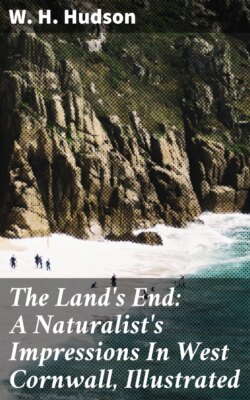Читать книгу The Land's End: A Naturalist's Impressions In West Cornwall, Illustrated - W. H. Hudson - Страница 4
На сайте Литреса книга снята с продажи.
CHAPTER I WINTERING IN WEST CORNWALL
ОглавлениеTable of Contents
England's "observables"—Why I delayed visiting Cornwall—A vision of the Land's End-Flight to St. Ives-Climate-The old town-The fishermen-Their love of children-Drowned babes—The fishing fleet going out at sunset-Old memories suggested-Jackdaws at St. Ives—Feeding the birds—A greedy sheep-dog-Daws show their intelligence—Daws on the roofs—Their morning pastime-Dialogue between two daws.
KNOW," said wise old Fuller, "most of the rooms of thy native country before thou goest over the threshold thereof. Especially seeing England presents thee with so many observables." But if we were to follow this advice there would be no getting out of the country at all. It is too rich in its way: the rooms are too many and too well-furnished with observables. Take my case. I have been going on rambles about the land for a good many years, and though the West Country had the greatest attraction for me, I never got over the Tamar, nor even so far as Plymouth, simply because I had not the time, albeit my time was my own. Or because there was enough and more than enough to satisfy me on this side of the boundary. It is true that one desires to see and know all places, but is in no hurry to go from a rich to a poor one. I was told by every one of my friends that it was the most interesting county in England, and doubtless it is so to them, but I knew it could not be so to me because of the comparative poverty of the fauna, seeing that the observables which chiefly draw me are the living creatures-the wild life-and not hills and valleys and granite and serpentine cliffs and seas of Mediterranean blue. These are but the setting of the shining living gems, and we know the finest of these, which gave most lustre to the scene, have been taken out and cast away.
Cornwall to me was just the Land's End-"dark Bolerium, seat of storms"-that famous foreland of which a vast but misty picture formed in childhood remains in the mind, and if I ever felt any strong desire to visit Cornwall it was to look upon that scene. Then came a day in November, 1905, when, having settled to go away somewhere for a season, I all at once made up my mind to visit the unknown peninsula and to go straight away to the very end. It almost astonished me when I alighted from my train at St. Ives to think I had travelled three hundred and twenty odd miles with less discomfort and weariness than I usually experience on any journey of a hundred.
It is common, I think, for lovers of walking to dislike the railway. So smoothly had I been carried in this flight to the furthest west that I might have been sailing in a balloon; and as for the time occupied it would surely be no bad progress for a migrating bird, travelling, let us say, from Middlesex to Africa, to cover the distance I had come in a little more than seven hours!
St. Ives is on the north side of the rounded western extremity of Cornwall, and from the little green hill, called the "Island," which rises above and partly shelters the town, you look out upon the wide Atlantic, the sea that has always a trouble on it and that cannot be quiet; and standing there with the great waves breaking on the black granite rocks at your feet, they will tell you that there is no land between you and America. Nevertheless, after London, I wanted no better climate; for though it rained heavily on many days in December and the wind blew with tremendous force, the temperature was singularly mild, with an agreeable softness in the air and sunshine breaking out on the cloudiest days. The weather could be described as "delicate" with tempestuous intervals. On bright, windless days I saw the peacock butterfly abroad and heard that idle song of the corn bunting, associated in our minds with green or yellow fields and sultry weather. I was still more surprised one day late in December at meeting with a lively wheatear, flitting from stone to stone near the Land's End. This one had discovered that it was not necessary to fly all the way to North Africa to find a place to winter in. Early in February I found the adder abroad.
